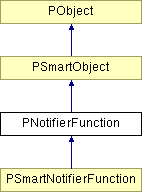
#include <notifier.h>
Inheritance diagram for PNotifierFunction:

Public Member Functions | |
| PNotifierFunction (void *obj) | |
| Create a notification function instance. | |
| virtual void | Call (PObject ¬ifier, INT extra) const=0 |
Protected Attributes | |
| void * | object |
This is an abstract class for which a descendent is declared for every function that may be called. The PDECLARE_NOTIFIER# macro makes this declaration.
The PNotifier# and PNotifierFunction classes build a completely type safe mechanism for calling arbitrary member functions on classes. The "pointer to a member function" capability built into C++ makes the assumption that the function name exists in an ancestor class. If you wish to call a member function name that does { not} exist in any ancestor class, very type unsafe casting of the member functions must be made. Some compilers will even refuse to do it at all!
To overcome this problem, as this mechanism is highly desirable for callback functions in the GUI part of the PWLib library, these classes and a macro are used to create all the classes and declarations to use polymorphism as the link between the caller, which has no knowledege of the function, and the receiver object and member function.
This is most often used as the notification of actions being take by interactors in the PWLib library.
| PNotifierFunction::PNotifierFunction | ( | void * | obj | ) | [inline] |
Create a notification function instance.
| obj | Object instance that the function will be called on. |
| virtual void PNotifierFunction::Call | ( | PObject & | notifier, | |
| INT | extra | |||
| ) | const [pure virtual] |
Execute the call to the actual notification function on the object instance contained in this object.
| notifier | Object that is making the notification. |
| extra | Extra information that may be passed to function. |
void* PNotifierFunction::object [protected] |
Object instance to receive the notification function call.
 1.5.1
1.5.1